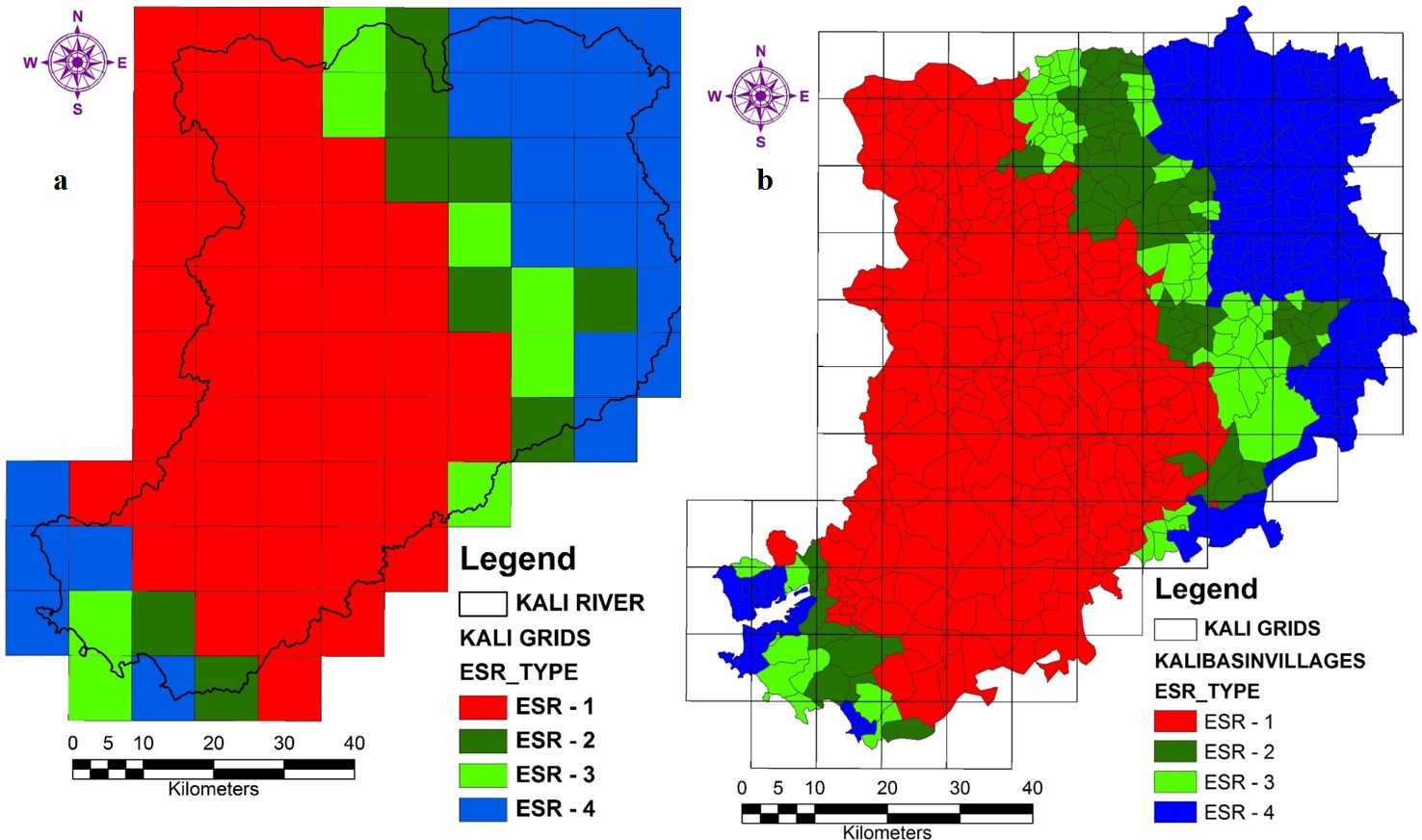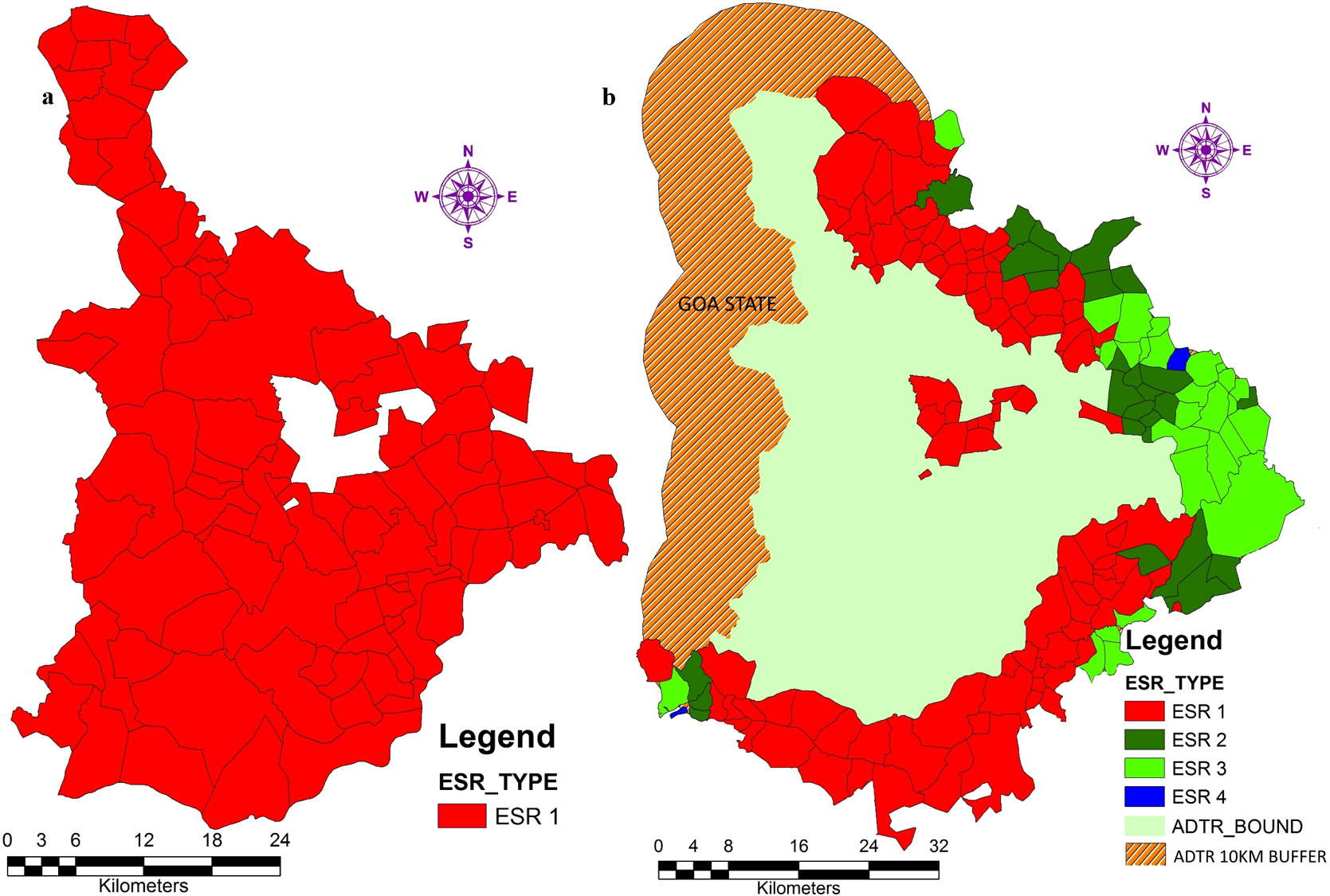 |
Ecological Sustainability of Riverine Ecosystems in Central
Western Ghats
|
 |
|
Discussion
Ecologically Sensitive Regions are ecologically fragile areas with rich repository of diverse
biological organisms and landscape elements. These regions contribute significantly in hydro-logical regime due to the catchment’s ability to retain water which is evident from the existence
of perennial streams. These biologically, hydro-logical and ecologically distinct regions are experiencing threats, especially in today’s’ rapid changing landscape scenario in the pursuit of development.

Fig. 11.Ecological Sensitive Regions of Kali River Basin and villages

Fig. 12.Ecological Sensitive Regions of KTR
Threats due to unplanned developmental activities affect the system at various levels with the serious consequences when once the activities cross the threshold. Some major threats are habitat fragmentation, negligence, conflict of interest and ineffective restoration/ improvement strategies. Lack of understanding of the complex ecological processes and evaluation of the ecosystem benefits have often led to the erosion of ecosystem quality affecting the sustenance of natural resources. To improve the scenario, thorough understandings of the complex ecosystem dynamics are important from conservation and management point of view. This entails identifying, mapping and monitor-ing of ESR for framing location specific conservation strategies. However, ESR demarcation and implementation process varies among regions, but the procedure to prioritize regions across geo-climatic zones and development pol-icies focuses on the conservation (Ndubisi et al. 1995). The legislative framework in India though made few sensible attempts towards assertive-ness for the ecosystem protection, but many of these approaches have become redundant due to deliberate misinterpretation by the pressure groups and exclusion of all vital stakeholders. The Environment (Protection) Act (EPA), 1986, and Section 5(1) of the Environment (Protection) Rules (EPR), 1986 lends the power to restrict industries, operations, or processes or class of industries on the basis of considerations like the biological diversity of an area. The CRZ (coastal regulation zones) regulation, 1991 also reflects similar clauses. These legislative measures, if implemented will bring a radical change in the protection of natural resources as well as improving livelihood of the people. But, the de-ficiency in implementation due to the fragment-ed governance and misinterpretation of conservation goals are posing serious threats. The conservation strategies cannot be looked with-in regional and state boundaries. In this context, the ecosystem approach as outlined in this pa-per would help in maintaining the ecological integrity through the sustainable management of physical and chemical integrity of an ecosys-tem. The implementation of ecosystem approaches in managing ecosystem would over-come the lacunas and also aid in the develop-ment of region while ensuring sustenance of natural resources. Thus, delineation, mapping, monitoring and sustainable management of ESR
involving all stakeholders and more importantly the appropriate legislative measures would certainly help in the ensuring water and food secu-rity in the peninsular India through conserva-tion of ecologically fragile Western Ghats. The water course forests in this region have not only rare species but also high biomass and greater carbon sequestration potential, which also calls for revision of forest management policies, as the innumerable stream courses offer tremen-dous potential for carbon stocking per unit area while improving the water retention capability of the forests. Rendering such service would also help in mitigating global climatic change. Subsistence farmers and other forest dwellers in these ecologically fragile regions becoming part-ners in micro -level planning for prudent water management are also likely to gain from carbon credits for their role as conservators of water-shed vegetation.
|
|
Citation : T. V. Ramachandra, Bharath Setturu, S. Vinay, 2018. Ecological Sustainability of Riverine Ecosystems in Central Western Ghats. J Biodiversity, 9(1-2): 25-42 (2018) DOI: 11.258359/KRE-159
| * Corresponding Author : |
|
Dr. T.V. Ramachandra
Energy & Wetlands Research Group, Centre for Ecological Sciences, Indian Institute of Science, Bangalore – 560 012, India.
Tel : +91-80-2293 3099/2293 3503 [extn - 107],
Fax : 91-80-23601428 / 23600085 / 23600683 [CES-TVR]
E-mail : tvr@iisc.ac.in, energy.ces@iisc.ac.in,
Web : http://wgbis.ces.iisc.ac.in/energy/
|
|